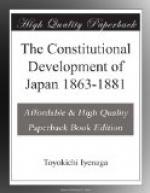While the government at home was thus tearing down the old framework of state, the Iwakura Embassy in foreign lands was gathering materials for the new. This was significant, inasmuch as five of the best statesmen of the time, with their staff of forty-four able men, came into association for over a year with western peoples, and beheld in operation their social, political and religious institutions. These men became fully convinced that “the wealth, the power, and the happiness of a people,” as President Grant told them, “are advanced by the encouragement of trade and commercial intercourse with other powers, by the elevation and dignity of labor, by the practical adaptation of science to the manufactures and the arts, by increased facilities of frequent and rapid communication between different parts of the country, by the encouragement of immigration, which brings with it the varied habits and diverse genius and industry of other lands, by a free press, by freedom of thought and of conscience, and a liberal toleration in matters of religion."[1]
The impressions and opinions of these men on the importance of a free and liberal policy can be gleaned from the speeches they made during the western tour, and some of their writings and utterances on other occasions.
The chief ambassador, Iwakura, in reply to a toast made to him in England, said: “Having now become more intimately acquainted with her (England’s) many institutions, we have discovered that their success is due to the liberal and energetic spirit by which they are animated."[2]
Count Ito, the present President of the Privy Council, in his speech at San Francisco, said: “While held in absolute obedience by despotic sovereigns through many thousand years, our people knew no freedom or liberty of thought. With our material improvement they learned to understand their rightful privileges, which for ages have been denied them."[3]
Count Inouye, the ex-Minister of State for Agriculture and Commerce, in his memorial to the government in 1873, said: “The people of European and American countries are for the most part rich in intelligence and knowledge, and they preserve the spirit of independence. And owing to the nature of their polity they share in the counsels of their government. Government and people thus mutually aid and support each other, as hand and foot protect the head and eye. The merits of each question that arises are distinctly comprehended by the nation at home, and the government is merely its outward representative. But our people are different. Accustomed for ages to despotic rule, they have remained content with their prejudices and ignorance. Their knowledge and intelligence are undeveloped and their spirit is feeble. In every movement of their being they submit to the will of the government, and have not the shadow of an idea of what ’a right’ is. If the government makes an order, the whole country obeys it as one man. If the government takes a certain view, the whole nation adopts it unanimously.... The people must be recalled to life, and the Empire be made to comprehend with clearness that the objects which the government has in view are widely different from those of former times."[4]




